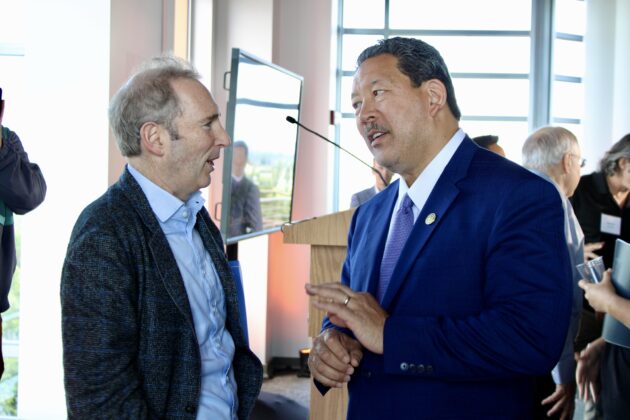
Seattle Mayor Bruce Harrell on Tuesday announced details of his planned 2025-26 budget, which includes $287 million collected from the Payroll Expense Tax to plug holes in the city’s general fund.
The tax, also known as JumpStart, has been a controversial revenue source that targets payrolls at the city’s largest companies, including tech giants such as Amazon.
The city currently faces a $250 million shortfall in its general fund, which totals $1.9 billion. Seattle’s overall budget is $8.3 billion.
JumpStart was passed five years ago to pay for affordable housing and homeless services, equitable economic development projects, and Green New Deal investments to help the city meet its environmental goals. It evolved out of a years-long battle over how the city should tax employers such as Amazon, which launched in Seattle more than two decades ago and has become the city’s largest employer.
Since 2022, the tax has been tapped to support the general fund, but this year’s proposal is the largest reallocation of those funds so far.
Harrell, in sharing his budget plans with the Seattle City Council and the public, said the sum collected through JumpStart is almost double what was predicted when the policy was enacted.
The higher amount allows the city to “maintain the spending amount forecast when the tax was originally proposed and use it to fund the priority buckets of housing and equitable development and climate action and the economic development for our city and youth mental health and safety,” Harrell said.
In other words, the city can still meet its JumpStart obligations — and use the extra money elsewhere.
Under Harrell’s proposal, $287 million from JumpStart goes to the general fund, $233 million goes to the “priority buckets,” and $43 million is earmarked for a new Payroll Expense Tax reserve created to provide fiscal security.
“This reconfiguration also allows us to close the deficit and invest in general fund essential services without tapping the rainy-day fund or our fiscal reserves or putting our triple-A bonding rating at risk,” the mayor added.
Revenue from JumpStart, under Harrell’s proposal, would potentially protect programs that Seattle needs in its bid to revive parts of the city that have struggled to bounce back following COVID-19 shutdowns. The general fund includes expenses for public safety, administration, education and human services, arts and culture, and other programs.
Amazon this month said that starting in January, its employees are expected to work in the office five days per week — a move being cheered by city leaders for its ability to boost revitalization by increasing foot traffic in downtown and stoking commerce near the company’s headquarters.
The City of Seattle itself mandated a return-to-office rule of its own last month, which was in turn applauded by Amazon.
Harrell said that using JumpStart as proposed would prevent “deep, unacceptable cuts” to the budget, though it does include layoffs for 76 employees and the elimination of 159 jobs total.
The city has been struggling with budget shortfalls, and in August 2023 released a report suggesting the tax rates imposed by JumpStart could be increased to boost revenue — but that option was not pursued.
Earlier the same year, leaders from the Seattle Metropolitan Chamber of Commerce and Downtown Seattle Association sent a letter to Bruce Harrell recommending that the JumpStart tax be suspended to help increase competitiveness and attract new companies to the city.
On Tuesday, Chamber of Commerce President and CEO Rachel Smith praised Harrell’s budget plans, saying “it delivers on public safety, supports downtown revitalization, recruits more first responders, continues to support the CARE team and prepares the city to host the FIFA World Cup 2026.”
“Voters have consistently said the city should balance the budget without raising taxes,” Smith added, “and the mayor’s proposal honors that while still making historic investments in housing and preserving shelter beds for people experiencing homelessness.”




